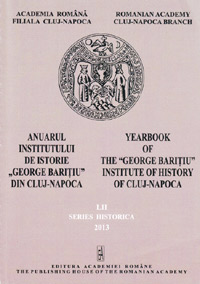Aspecte ale anexării Basarabiei de către Imperiul ţarist în 1812. Implicaţii asupra culturii, limbii şi învăţământului
Aspects of Bessarabia’s Annexation by the Russian Empire in 1812. Its Implications in the Fields of Culture, Language and Education
Author(s): Ramona PrejaSubject(s): History
Published by: Editura Academiei Române
Keywords: Bessarabia; 1812; 19th century; Russification; Romanian language; culture; church; school
Summary/Abstract: The study offers a digest of Bessarabia’s history after its annexation by the Russian Empire (1812) and during the 19th century, illustrated by valuable statistical data concerning especially the population and the educational system. The administrative measures adopted by the tzarist occupation authorities were accompanied by a demographic politics of colonization. On one hand, the Romanian population crossed in large numbers the Prut river, taking refuge to the Romanian Principalities; on the other hand, the tzars Alexander I and Nicholas I brought to Bessarabia foreign colonists from Switzerland (Lausanne), France, Greece, Poland. Mass colonizations of Bulgarians, Germans, Jews and Gagauzians were intended to change the demographical balance and to pave the way to Russification. In spite of their difficult political and national situation in Bessarabia, the Romanians manifested active resistance to Russification by culture, as they managed to continue editing books even if in small numbers, preserving the Romanian language in their primary and secondary schools, as well as in their churches. The passive resistance was reflected in the refuse of the Romanian population to learn and use the Russian language.
Journal: Anuarul Institutului de Istorie »George Bariţiu« - Series HISTORICA
- Issue Year: LII/2013
- Issue No: 52
- Page Range: 19-28
- Page Count: 10
- Language: Romanian

